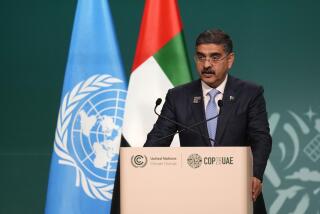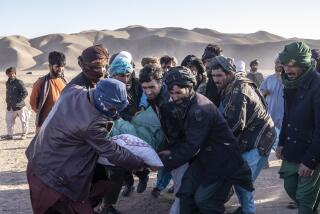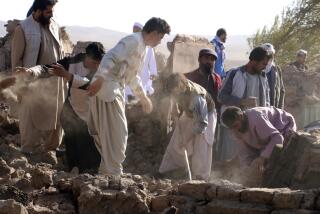Five Killed, 64 Injured in Jalalabad Bombing
- Share via
JALALABAD, Afghanistan — In what appeared to be an assassination attempt against Afghanistan’s defense minister, a fiery bomb exploded Monday in a lunchtime market packed with flag-waving schoolchildren dispatched to greet the official.
At least five people were killed, including two children and a teenage boy, and 64 people were injured. The bomb missed the heavily armed convoy of Defense Minister Mohammed Qassim Fahim by just 200 yards.
Tensions had been high in this eastern provincial capital because of opposition to a government crackdown on opium poppy cultivation and simmering hostility toward Fahim, an ethnic Tajik deeply resented by Pushtuns who dominate the region. In the last two nights, unsigned posters have appeared, warning that anyone supporting the government risks death and that “killing government officials is legitimate.”
In an attempt to build crowds for Fahim, teachers emptied classrooms. “We were told everyone should come out to the streets and bring flags and flowers,” said 8-year-old Abdul Wahab. “Our teachers told us that if we didn’t show up we would be counted five days absent.”
The bombing came just days after the interim government rounded up about 300 members of the Hezb-i-Islami political party, most of them Pushtuns, on charges of plotting to overthrow the government. Hezb-i-Islami officials described the arrests as an anti-Pushtun campaign by ethnic Tajik ministers. About 160 people remain in custody.
The ethnic conflict added a new layer of fear and anxiety to a country already on edge because of armed factions jockeying for position ahead of a national assembly scheduled in June.
In an interview Sunday night, Haji Mohammed Zaman, the regional security chief, had dismissed security concerns with a wave of his hand.
That same evening, Zaman’s officers tried and failed to organize soldiers in ill-fitting uniforms into a coherent formation during a dress rehearsal for the defense minister’s visit. Their poor training was evident in the moments after the bomb exploded, when attempts to turn around the convoy of dignitaries produced gridlock as victims lay bleeding and dying.
Vehicles bumped back and forth for several minutes before security officials finally drove Fahim, dressed in a brown business suit and tie, to a military base outside Jalalabad. He delivered a scheduled two-hour speech on ethnic unity, then returned to the capital, Kabul, by helicopter a day earlier than planned.
“They killed civilians and students who were there in the spirit of happiness, and they made it into a sad occasion,” Fahim said. “The attack was meant not only to kill me. They wanted to cause a disruption and send a message.”
Haji Abdul Qadir, the governor of Nangarhar province, said: “This is the work of criminals. We will catch them in a few days.”
No group claimed responsibility for the attack. The appearance of the Pushtun-language posters, which denounced the interim government as a cabal of “non-Muslim” traitors conspiring with the United States and Britain, suggested continuing underground support for the Pushtun-dominated Taliban.
Abdul Rahim, a Nangarhar provincial security officer who witnessed the explosion, called the bombing at the Chauk Talashi market an assassination attempt against Fahim and local political and military officials, who were part of the convoy.
“It’s obvious the convoy was the target, and they just missed,” he said.
The explosion splattered snack shops and fruit carts with blood. A row of shops was burned and buckled, and the Afghan flags strung for the occasion were left shredded. The shoes and hats and tattered robes of the victims were lined up neatly in the dust, awaiting the arrival of relatives to claim them.
Security officers at the scene said Fahim was scheduled to stop at the market at noon to visit the construction site of an underground shopping arcade, the first government project since the Taliban was driven from the city in November.
It was not known whether the bomb, which exploded at noon, was triggered by a timing device or remote control. Soldiers said it had been hidden beneath a diesel-powered generator and attached to the generator’s battery. Generators are common in Afghan cities, where the electrical supply is spotty.
“I was just telling the shopkeepers to close up because the motorcade was coming--and boom!--the generator went flying and bodies were everywhere,” said Noor Agah, a soldier who said he escaped injury because he was standing behind a tree.
“I picked up a body and the arm came off,” Agah said. “He was dead. Then I saw a body that was only pieces of a person.”
One of the victims was 15-year-old Haroon Gul, who worked in one of the open-front restaurants.
“He was just working there selling cakes and pastries,” said his mother, Saima Gul, wailing in grief.
Area Poppy Growers Angry Over Crackdown
Fahim and other officials from Kabul arrived Monday morning in Jalalabad, Afghanistan’s gateway to the Khyber Pass and Pakistan, to meet with regional leaders who, like Fahim, were part of the Northern Alliance coalition that defeated the Taliban.
Fahim arrived just four days after the government announced a plan to outlaw opium poppy cultivation. Nangarhar is the country’s second-leading opium producer and the source of its highest-grade opium. Poppy farmers have threatened violence if the government attempts to destroy their crops, which are due to be harvested in a week or so.
Travelers between Jalalabad and the Khyber Pass reported that the road was blocked in several places by angry growers who stoned passing cars. An international aid worker said he was forced to turn back to Jalalabad.
Soldiers under the control of Zaman and Hazrat Ali, the regional corps commander, are nominally under the command of Fahim. They would be needed for any attempts to plow under, burn or chop down farmers’ poppy crops.
The bombing sent ripples of fear through Jalalabad. Parents whisked their children from the streets. Shopkeepers rolled down their stores’ metal shutters and hurried home.
Gunmen loyal to commanders Zaman and Ali careened through the streets in pickup trucks, horns blaring. Normally armed with only automatic rifles and sidearms, they brandished grenade launchers and antitank weapons immediately after the bombing.
Anxious Relatives Swarm Hospital
At Sehate Ama hospital, a crowd of men and boys punched and shoved one another as they struggled to read a handwritten roster of the dead and wounded that had been posted on a pharmacy wall. Finally a man began to shout out the names of the wounded: “Ali Ahmad, 6 years old, son of Nazir Gul, serious condition . . . “ and there were gasps.
Late in the afternoon, Ali, the corps commander, visited the wounded. He promised the family of each victim $100 but did not say where the money would come from, according to Hash Matullah, who was visiting a cousin wounded in the attack.
Amin Ullah, a nurse, said 20 of the wounded were in critical condition. He stood outside the operating theater, his green scrubs flecked with blood. “They’re working on one of them now. I don’t think he’s going to make it,” he said.
In a grimy room just off the main corridor, five men lay on gurneys, their heads and limbs wrapped in gauze and IV tubes strapped to their arms. They stared up at the windows, where the desperate faces of men and boys peered in from outside in search of loved ones, their heads casting dark shadows in the brilliant spring sunlight.
Mohammed Zargai, 26, a spindly vegetable cart vendor whose legs were cut and burned, said he had decided to go home at noon because soldiers had ordered him to shut down his cart in anticipation of Fahim’s arrival. “I was just starting to walk across the street when the bomb went off, and I was knocked to the ground,” he said.
Akim Khan, 25, lay with both legs bloodied and bandaged. He said he had arrived here Sunday from the Pakistani border city of Peshawar to visit a friend. He was walking to the friend’s house through the square when the bomb exploded, he said.
“I got blown into the street, and then I woke up and a taxi driver was pulling me into his taxi,” Khan said. “God was with me today.”
More to Read
Sign up for Essential California
The most important California stories and recommendations in your inbox every morning.
You may occasionally receive promotional content from the Los Angeles Times.














